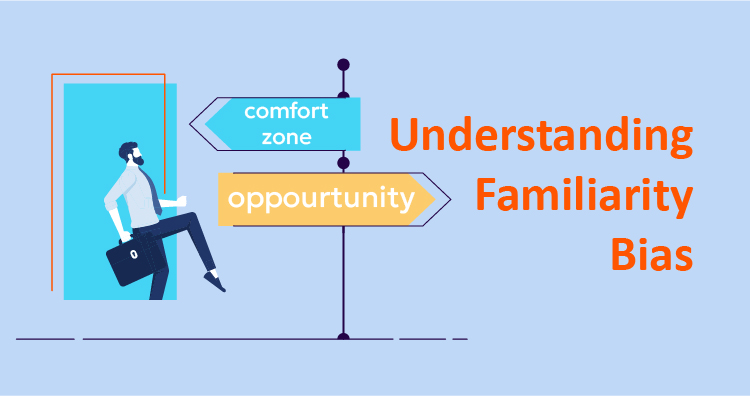


Unveiling the Secrets of Familiarity Bias: The Hidden Factor Affecting Your Investment Decisions
Are you confident in your investment decisions? Do you ever wonder why you have a tendency to invest in familiar companies or industries? If so, you may be falling victim to familiarity bias, a hidden factor that can significantly impact your investment success. In this blog post, we will take a deep dive into the world of familiarity bias and explore its effects on your decision-making process. Get ready to uncover the secrets that could be holding back your investment portfolio!
What is Familiarity Bias?
At its core, familiarity bias is a cognitive bias that leads individuals to prefer familiar things over unfamiliar ones. When it comes to investments, familiarity bias manifests as a preference for well-known companies or industries, even if there may be better opportunities elsewhere. This bias can be particularly problematic because it limits your exposure to diverse investment options and prevents you from maximizing your returns.
The Comfort of the Familiar
It's not surprising that familiarity bias exists. As humans, we naturally seek comfort and security. We are drawn to what we know and feel at ease with. When it comes to investments, this comfort often leads us to choose familiar stocks or industries because they align with our existing knowledge and experiences. However, relying solely on familiarity can lead to missed opportunities and potential losses.
Overcoming Familiarity Bias
If familiarity bias is a part of your decision-making process, fear not! There are strategies you can employ to better navigate the investment landscape and overcome this bias.
One of the most effective ways to combat familiarity bias is through education and research. Take the time to broaden your knowledge about different industries and companies. By understanding a variety of investment options, you can make more informed decisions and reduce the influence of familiarity bias.
Another powerful tool to counter familiarity bias is diversification. By spreading your investments across various sectors and asset classes, you can reduce risk and increase the likelihood of better returns. Diversification helps you step outside your comfort zone and embrace opportunities that may not be immediately familiar to you.
Seeking professional help can provide you with fresh perspectives and help you overcome familiarity bias. Financial distributors and investment professionals are trained to identify biases and guide you towards more objective decision-making. They can offer insights into investments you may not have considered and help you build a well-rounded portfolio.
The Power of Emotional Intelligence
While familiarity bias may seem like a purely rational or logical concept, emotions play a significant role in shaping our investment decisions. Emotional intelligence, or the ability to recognize and manage emotions, can greatly impact our investing success.
Developing self-awareness is a crucial aspect of emotional intelligence. Recognizing your own biases, including familiarity bias, is the first step towards overcoming them. Regularly evaluate your investment decisions and ask yourself if familiarity played an outsized role. By building self-awareness, you can take proactive steps to mitigate the effects of familiarity bias.
Controlling your emotions in the face of investment decisions is key to avoiding the pitfalls of familiarity bias. When emotions run high, take a step back, and evaluate the situation objectively. Engage in practices like meditation or deep breathing exercises to regain focus and avoid making impulsive decisions based solely on familiarity.
Familiarity bias can unknowingly trap us into following the crowd. By choosing well-known companies or industries, we may overlook hidden gems that have the potential for significant growth. In order to truly maximize our investment potential, we must be willing to venture into the uncharted territory and explore lesser-known options.
Conclusion
Familiarity bias is a factor that affects many investors, often without their knowledge. By recognizing this bias and implementing strategies to overcome it, you can broaden your investment horizons and unlock new opportunities. Remember to educate yourself, diversify your portfolio, seek professional help, and develop emotional intelligence. By doing so, you'll be well on your way to making more informed investment decisions and achieving long-term success. So, step out of your comfort zone and embrace the unknown – your investment portfolio will thank you!
Note: This blog post is meant for informational purposes only and should not be taken as financial advice. Always consult with certified financial distributors before making any investment decisions.
Mutual fund investments are subject to market risks, read all scheme-related documents carefully.
T9-305, Valley View Estate, Gwal Pahari,
Gurgaon- Faridabad Road,
Haryana, India
+91 98113 26036
Risk Factors – Investments in Mutual Funds are subject to Market Risks. Read all scheme-related documents carefully before investing. Mutual Fund Schemes do not assure or guarantee any returns. Past performances of any Mutual Fund Scheme may or may not be sustained in the future. There is no guarantee that the investment objective of any suggested scheme shall be achieved. All existing and prospective investors are advised to check and evaluate the Exit loads and other cost structures (TER) applicable at the time of making the investment before finalizing any investment decision for Mutual Funds schemes. We deal in Regular Plans only for Mutual Fund Schemes and earn a Trailing Commission on client investments. Disclosure of commission earnings is made to clients at the time of investments.
AMFI Registered Mutual Fund Distributor – ARN-66983 | Date of initial registration – 22-Jul-2022 | Current validity of ARN – 22-Jul-2025
Important Links | Disclaimer | Disclosure | Privacy Policy | SID/SAI/KIM | Code of Conduct | SEBI Circulars | AMFI Risk Factors
